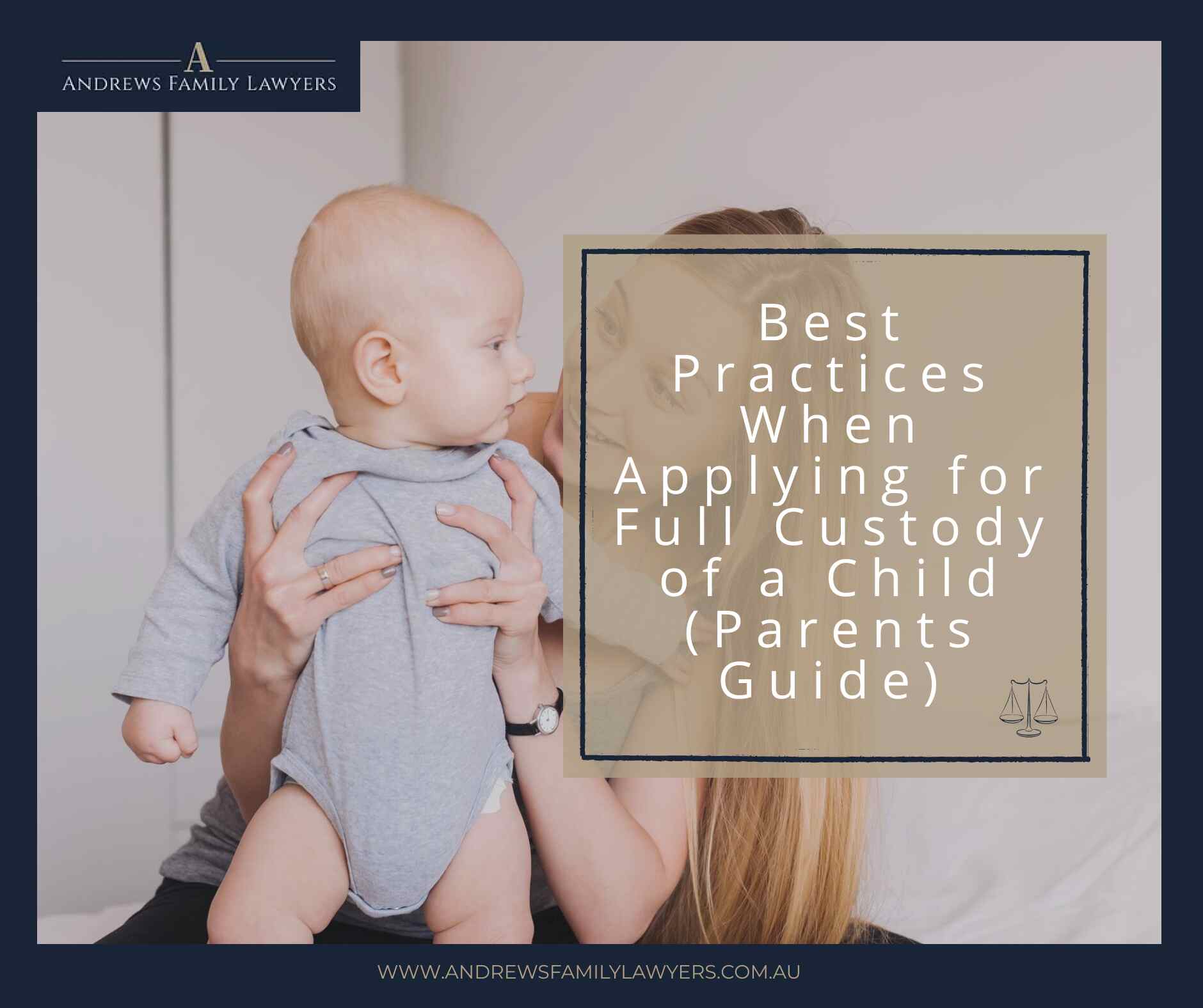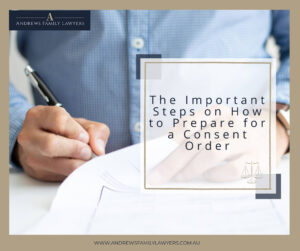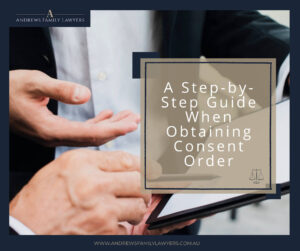Child custody is one of the most critical factors in family law. Custody arrangements can incorporate one or both parents. The Court prefers both parents to have an equal say in a child’s life.
However, there are situations where it may be in the child’s best interest to provide one parent with all the duties of parental responsibility, known as full child custody. This brings us to applying for full custody of a child, which involves demonstrating that sole parental responsibility is the best option for the child’s welfare.
Key takeaways
The Family Court prefers parents maintain equal shared parental responsibility.
Both parents will typically receive equal or substantial time with their children.
Sole parental rights give one party complete control of a child’s life decisions.
There are several reasons why the Court may grant sole parental responsibility;
Evidence of family violence or abuse;
Substance abuse or mental health issues;
Neglect or disinterest.
Alternative dispute resolution is a crucial step in parenting arrangements. Before seeking parenting orders for sole custody, mediation can help create better opportunities for the children involved.
If mediation fails, there’s a legal process for applying for sole parenting responsibility.
Equal Shared Parental Responsibility in the Family Law Act
The Family Law Act 1975 assumes that equal parental responsibility in parenting arrangements is in the child’s best interests. This principle states that both parents will have an equal say in major life decisions in the child’s life. This may include decisions about education, health and religious instruction. Equal parental responsibility doesn’t imply that each parent will have equal time with the child.
When crafting a parenting court order, the Family Court will opt for equal or substantial and significant time for each parent. Substantial time means that while the child may live with one parent, the other parent will spend time with them on:
Weekdays;
Weekends;
Holidays;
Events of special importance to the child, such as birthdays.

Sole parental responsibility
Sole parental responsibility gives one parent complete discretion to make decisions for a child. They can decide on education, health matters and religion. They may also determine the child’s living arrangements. Sole responsibility doesn’t necessarily mean the other parent has no visitation rights. Contact with both parents is still encouraged by the law.
Learn More: Discover The Child Custody Laws in Australia
Reasons for sole responsibility
Evidence of Family Violence or Abuse
Suppose there’s credible evidence that a parent’s involvement would risk the child’s safety, welfare, or psychological well-being due to abusive behaviour. In that case, the Court may decide that sole parental responsibility to the other parent is necessary.
Key considerations include:
Physical, emotional, or sexual abuse and its impact on the child.
Credible evidence supporting the claims of abuse.
Evaluating the potential future risk to the child.
Depending on age and maturity, the child’s views may be considered.
Overall parenting capacity, history of family violence, and any protective measures in place.
Substance Abuse or Mental Health Issues
Evidence of substance abuse or mental health issues can justify the Court granting sole parental responsibility. This is particularly true if these issues impact the parent’s ability to safely and effectively care for the child.
Key considerations include:
How substance abuse or mental health issues affect the parent’s capacity to provide safe, stable, and nurturing care.
Assessment of any immediate or long-term risks to the child’s physical and emotional well-being.
Whether the parent with issues is seeking treatment and how effectively the condition is being managed.
The extent and duration of the issues and any documented evidence or professional assessments.
The ability to meet the child’s needs includes emotional support, stability, and guidance.
Neglect or Disinterest
Suppose a parent demonstrates a lack of interest or neglects their parenting responsibilities. In that case, it may lead the Court to determine that sole parental responsibility to the other parent is in the child’s best interest.
Key considerations include:
Neglect or disinterest that compromises the child’s safety, health, or emotional development.
The child’s need for consistent care and a stable environment.
The extent of each parent’s involvement in the child’s life and willingness to take on parenting responsibilities.
Past behaviour and the level of commitment each parent shows towards parenting duties.
How the parent’s disinterest or neglect has affected the child’s well-being and development.

Alternative Dispute Resolution
Alternative Dispute Resolution (ADR) involves several key components, especially when trying to avoid sole parental responsibility:
Family Dispute Resolution (FDR)
FDR involves a neutral third-party mediator helping parents negotiate parenting arrangements.Mediation Session
The mediator facilitates structured discussions where parents can express their views and concerns.Communication Improvement
ADR aims to improve communication between parents, which is crucial for effective co-parenting.Developing a Parenting Plan
Parents work towards a mutually agreeable parenting plan detailing living arrangements, decision-making, and child-rearing aspects.Legal Advice
While ADR is less formal than Court, obtaining legal advice can help parents understand their rights and options.Child Inclusive Practices
Some ADR processes involve professionals specialising in understanding and articulating the child’s perspective.Follow-Up Sessions
Some ADR processes may include follow-up sessions to adjust the parenting plan as needed.
Benefits
Seeking ADR methods in Australian family law offers several benefits. A family dispute resolution conference allows one to avoid the need for sole parental responsibility.
Reduces Conflict
ADR fosters cooperation, reducing conflict and stress for both parents and children.Child’s Best Interests
Encourages decisions focused on the child’s best interests rather than adversarial court outcomes.Saves Time and Money
Generally, it is faster and less expensive than court proceedings.Improves Communication
It helps parents develop better communication skills for future co-parenting.More Control
Parents have more control over outcomes, unlike court-imposed decisions.Confidentiality
ADR processes are private, unlike court cases, which can become public record.Flexibility
Solutions can be more creative and tailored to the family’s unique needs.Preserves Relationships
It can help maintain amicable relationships, which is essential for effective co-parenting.Emotional Well-being. A less adversarial nature reduces emotional strain on all parties involved.
Compliance
Agreements reached mutually are more likely to be adhered to than court orders.

Applying for Sole Custody
First, seek legal advice to understand your rights and the process.
Before Court, you must attempt FDR unless exemptions like family violence apply.
If FDR fails or is exempt, you’ll receive a certificate to proceed with court action.
Prepare and file an application with the Federal Circuit and Family Court of Australia.
Include detailed reasons for seeking sole responsibility, focusing on the child’s best interests.
Legally deliver court documents to the other parent, allowing them to respond.
If immediate decisions are needed, apply for interim orders.
The Court may order a family report by a consultant assessing the family situation.
Present your court case with evidence supporting why sole responsibility is in the child’s best interest.
Follow the Court’s final orders.

Conclusion
The Family Law Act 1975 emphasises equal shared parental responsibility. It values both parents’ involvement in major decisions in the child’s life. However, circumstances like abuse, substance abuse, mental health issues, neglect, or disinterest can lead to one parent applying for full custody of a child. This step involves seeking sole parental responsibility to prioritise the child’s safety and wellbeing.
Alternative dispute resolution offers a less adversarial approach, fostering cooperation and potentially avoiding the need for sole custody. Any court decision or agreement ultimately serves the child’s best interests. This ensures their stability and healthy development.
If you need assistance with child custody, Andrews Family Lawyers can help.




